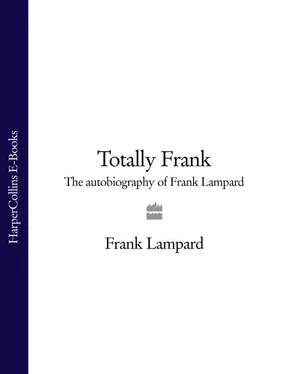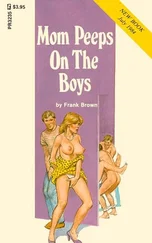Essex has proven to be a rich breeding ground for footballers and my era was no different. Senrab were more from the East End of London and had a bit of a rough edge to them. They were mainly working-class boys who were desperate to make it as footballers while Heath Park was slightly different. We were Essex lads.
Heath Park and Senrab have become quite famous as the clubs where players who have gone on to be a success began their careers. Ashley Cole, Ledley King, Lee Bowyer and J. Lloyd Samuel all cut their teeth at Senrab while a talented lad by the name of John Terry also started out there. John was three years younger than me so we never actually played against each other but even back then I began to hear things about him: how good he was, how strong he was.
Where I grew up, football was in people’s blood. It was part of their DNA and it was certainly in mine. People talked all the time about the game and were interested in it at all levels. Nowadays, kids under ten go to academies which are part of professional clubs to train and learn. Others attend courses run by clubs or the Football Association. When I was that age, Sunday football was the academy.
It seemed that more often than not when we played Senrab in the league that they would beat us but if it was a cup game then we would win. Fortunately, we had a habit of winning most of our games and when we won the league it was usually because we were more consistent than them. Our strength was in our team spirit. They had a few more ‘individuals’ and enjoyed playing that way but the rivalry between us was intense. Players were loyal to each club and people would talk about who was the best and who might make a career in football.
There was always a buzz about who the next professional player was going to be and at Heath Park it wasn’t Frank Lampard. Michael Black was a team-mate of mine and everyone was sure that one day he would be a famous footballer. Michael was skilful, good with the ball and hard to beat. He was the best of the bunch – the Essex Wayne Rooney of his day. Whenever we played a game the would score or be man-of-the-match. I looked at Michael and made a decision. I wanted to be that good. In fact, I wanted to be at least as good and hopefully get better. That was how I felt at that age and I realize that it’s been a recurring theme in my life and career.
Between Heath Park and Senrab we dominated the area and most years we carved up the trophies between us. I enjoyed my share of the spoils even if being the youngest of three kids and the only boy meant I had the smallest room in the house. That didn’t stop me from getting it kitted out with shelves all around and I had all my trophies and medals stockpiled above me as I lay in bed.
We trained during the week and played at weekends. Our coaches would work on our fitness and try to develop our understanding of the game. When we played matches, though, it was more than just the manager’s voice I heard from the touchline.
Almost everyone’s Dad (and Mum) would turn out. Each would have different and constant advice for the team, which they would shout at will. You might think my Dad would have been at the centre of this scrum of tactical wit. What with his background and knowledge, the others would be quiet and let him speak. Not a bit of it.
He would deliberately stand behind the other parents, collar up and stay deadly silent. He was aware of the reaction he would provoke if he were to hog the touchline and shout the odds. More important, he knew how self-conscious I would be if he were to do that. Just knowing he was watching was enough to make me nervous so he became quite adept at pretending he wasn’t there.
There were times when he hid behind a tree or a fence so that I couldn’t see him. He must have looked a bit odd traipsing around the shadows like some football Inspector Clouseau. He couldn’t keep up his disguise for long though. When I got home he would ask me how I had played. I would say ‘pretty good’ only to have him disagree. He would mention something I could have done better or a chance I should have taken and I realized that he had been there after all.
Dad has always been my football touchstone, my coach and critic, an inspiration and aggravation. I have an awful lot to thank him for even if sometimes I hated him. I knew from that very early age that I wanted to be a footballer. It was all I wanted. Dad knew it too and I think he wanted it just as much, perhaps more in those days.
He introduced me to certain training regimes which he knew would build up my physical strength and also instil a mental discipline essential to becoming the very best you can. Some of it was fun, though not for Mum. Dad would put mats down in different positions on the floor of the lounge in our house, then he would get a ball and throw it low down where I had to catch it and get up immediately when he would already be throwing it again in another direction. We would keep at it for ages until I needed a break. Mum would storm through the door shouting at us.
‘Keep the noise down,’ she’d say. ‘And stop messing the place up.’
We’d stay very still. And silent.
‘Honestly, you two think this place gets clean by itself.’
When it was safe to speak, Dad would get in his retort.
‘It’s important for him to be as agile as possible,’ he’d say in the hope that his reason would register against Mum’s protest about the housework. Mum turned on her heel and closed the door, pretending to be annoyed. We’d smile knowingly at one another and start again but it wasn’t all good fun.
When Dad was at West Ham as an apprentice he bought himself a pair of running spikes which he wore when he practised his sprinting after training with the rest of the squad. I didn’t inherit his shoes but I did get the habit. I think I was about ten when I started my ‘spikes’. I would go into the garden and run the length and back repeatedly. It was important to start the sprint with a burst because that’s what helps you catch an opponent or allows you to get away from your marker.
Almost every day I would do spikes. Mum got very annoyed because she had grown a beautiful lawn of lush green grass and there I was ripping it to shreds. Sometimes I did it with Dad’s supervision, sometimes not. If Dad had been out and he found me in my room doing homework or watching TV he would always ask me, ‘Have you done your spikes?’ I was quite proud when I could say yes. When I couldn’t, he wouldn’t be forceful. Instead, he had a great knack of suggesting that if I didn’t do them then bad things would happen. Not punishment of any kind. Oh no, worse – I wouldn’t get quicker, more agile or have more stamina. In other words, I might come up short when it came to making the grade as a player.
For me, that threat was enough. Out I went no matter the weather and did my spikes. I still did them even after I turned professional. I used to hide them at West Ham’s Chadwell Heath training ground because I was embarrassed but after training, when all the other older pros had gone home, I would run up and down outside the gym. Dad would sometimes catch sight of me from his office across the way and I would see him smile or nod. I became quite superstitious about it. Of course, it didn’t help having Dad ask me all the time – even when I was in the West Ham first team. That was the thing with Dad. He didn’t want to have to tell me. He wanted me to do it of my own accord.
It wasn’t just me he affected in that way though. When Rio Ferdinand and I were apprentices at West Ham he would take Rio after training and do an hour’s practice on his heading. Rio is an incredibly talented footballer. He can do things with his feet that a lot of ball players would struggle to. But when it was decided that he should be a defender, he wasn’t the best with his head. Dad coached him and after a while Rio took it upon himself to find someone else to help him practise. The most important lesson was mental discipline and all of the players at the very highest level have it.
Читать дальше












